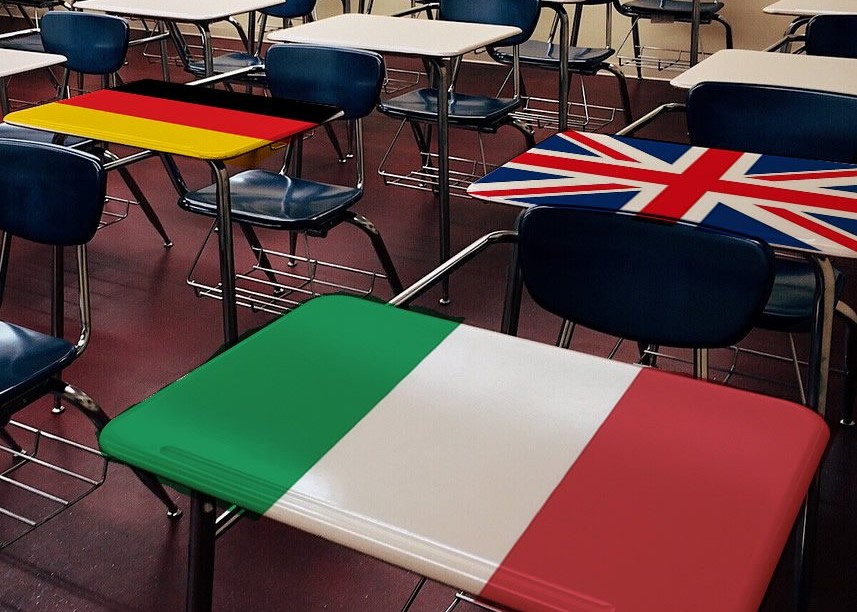
This month’s topic is a little bit challenging, not because it is difficult or controversial, but because it is a rather wide one which comprises different aspects and requires a lot of space for it to be properly discussed. I have chosen this issue because I am particularly fond of the concept and I strongly believe that it is an incredibly important one, that stands at the core of our development, both as individuals and as a society. And the subject is: education.
My goal is not to provide a theoretical description of the education system here in Italy and in the U.S., but my wish is to be able to depict the picture of how education is perceived and considered by young people in Italy, what kind of expectations they have for it, what it means for them and try to identify possible major differences between Italy and the United States.
To do that, I will resort to my own personal experience as a student – luckily, I haven’t left the school desks that long ago – bearing in mind however the awareness that every experience also depends on a lot of different factors and that it can be a very subjective and personal one.
I think that, behind the surface of that unwillingness to get up early, study for four to five hours per day, having to deal with professor and subjects we do not like or that do not like us, and the significant anxiety caused by exams and tests, everyone should really feel grateful for the immense opportunity to have access to the education system, go to school and receive a proper education. What might sometimes feel, especially at the very early stages, as an obligation or a burden that influence our social life, it is honestly a privilege that should not be taken for granted. It might take a while to truly realize this, but we get there eventually.
School is not only a place where you are taught theoretical notions about a wide variety of subjects, but it is (should be) also a space where one can be inspired, motivated, encouraged, challenged, and shaped; can learn how to think critically and independently; make friends and grow as a person. It should be a safe and healthy environment where constructive criticism and debate are kindly carried out, different opinions welcomed, creativity sparked, community strengthened. Unfortunately, I do not think that the overall education system in Italy is quite there yet. As much as the system works, providing access to everyone, facilitating those who face financial struggles and offering a lot of various choices, its flaws can still be clearly perceived by students. It is my belief that the education system here in Italy tends to be primarily theoretical giving very little space – none in most cases – to practical exercises and simulations, training courses, sport activities, cultural initiatives like theater classes or book clubs, courses to help students develop their soft skills.
Even though each state is different, I do believe that overall this practical aspect of education finds more room within the U.S. education system as the typical high school experience in the United States involves a lot of clubs, organizations, debates, theater and production; drama classes and sports are integral part of school curricula; the theoretical notions taught are then implemented through exercises and models like the UN one; practical tests and lessons are carried out in laboratories and further cultural exchanges are encouraged.
Coming back to our country, students’ sentiments are perhaps mainly addressed towards the lack of a direct connection between schools and employment; in fact, as 2020, the high rate of unemployment among young people in Italy seems to be in part caused precisely by shortcomings between the education system and the world of work, long educational paths, and the fact that the Italian education system is still indeed extremely theoretical for the most part and it comprises old teaching programs. In general, most young people who hold a degree don’t perceive that a good education will directly lead to a stable and adequately profitable job.
As a matter of fact, the perception is that, despite all the many different things you can learn at school, it kind of fails in providing an effective, strategic, and direct connection with future jobs in terms of preparing students for that, offering practical tools and experiences, equipping them with resources and knowledge to face the frightening process of finding a job or an internship.
A report carried out in 2017, called “Focus Scuola” del Rapporto Giovani, that based its poll on 9.000 youngsters between 18 and 32 years of age, found that 60.5% believes that education is also a useful tool to go through life, 55.6% thinks that it can be beneficial in finding a better job and 24.1% that it can help find one more easily and 9.3% is convinced that education is useless. While these figures do not appear to be that satisfying, I think it is encouraging that – within the very same poll - education is primarily deemed as functional in equipping a person by enriching his/her abilities and knowledge by 80.5% of the people interviewed, in favouring one’s ability to reason by 75.9% and, lastly, in being with others by 75.3%.
As Nelson Mandela said, “education is the most powerful weapon you can use to change the world”; I strongly and deeply agree with this statement and my hope is that more people start to believe that too. While we appreciate the luck we have in embarking on a full educational path, we should also widen our minds (and our education system) since going to school does not only mean learning what is written on textbooks, but it should be about creativity, inventiveness, human relations, developing soft skills, engaging in cultural and social activities, and preparing students to face their future in the best way they can.



